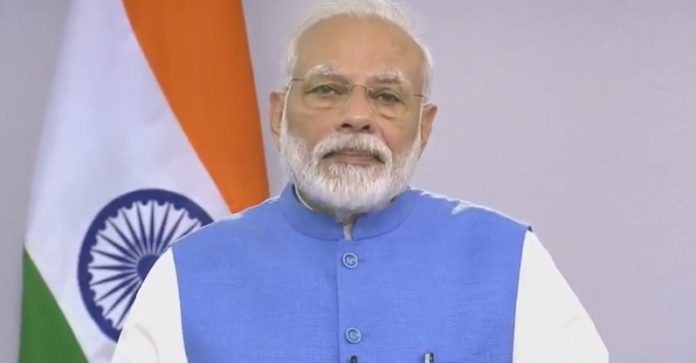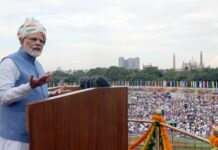New Delhi (IANS): Prime Minister Narendra Modi on Thursday announced the formation of a COVID-19 economic response task force that will be led by Finance Minister Nirmala Sitharaman.
Modi said the task force will assess the requirements of various sectors and also oversee implementation of the proposed measures.
The decision comes after a severe impact of COVID-19 on several sectors, including aviation, hospitality and tourism along with the overall economy.
Addressing the nation, the Prime Minister also promised availability of essential items and services, including medicines, health care, milk and food.
He also urged the citizens to avoid panic buying and not to hoard essential items.
The task force will consult stakeholders, take feedback, on the basis of which decisions will be taken to meet the economic challenges posed by COVID-19. The task force will also ensure implementation of the decisions taken to meet these challenges.
The Prime Minister urged the business community and higher income groups to look after the economic needs of those from lower income groups, from whom they receive various services, urging them not to cut their salary on the days they are unable to render the services due to inability to come to the workplace.
The task force may look at measures such as extension of loan tenors for MSMEs and relaxing NPA norms, while on the taxation part, GST may be waived on hospitality and tourism sectors.
Airline companies, too, might get relief from airport charges.
In terms of COVID-19 economic fallouts, ratings agency Crisil had cut its base-case gross domestic product (GDP) growth forecast for fiscal 2021 to 5.2 per cent from 5.7 per cent announced recently.
“In any case, India has little policy firepower to give a meaningful push to growth, and the pandemic is making it more difficult,” Crisil said in a report.
“While there will be steeper deceleration in global growth and India’s trade, what is unclear is the extent of impact on economy through domestic channels of production (supply) and consumption (demand).”
Lately, many companies in the aviation, tourism, export-oriented sector, particularly textile manufacturers and even the multiplex and retail sectors, have been heavily dented by the COVID-19 outbreak.
Many companies such as IndiGo and GoAir have announced pay cuts and leave without pay for employees.
Industry watchers contend that if the spread of Covid-19 infection rate continues, then the companies will be forced to downsize.
Meanwhile, the country’s key stock markets have witnessed massive bouts of volatility which has eroded lakhs of crores of investors’ wealth.
According to Nilesh Shah, MD at Kotak AMC, if India faces a similar impact as China, the domestic GDP growth may fall by around two per cent.
Various industry bodies have suggested that the Centre should come out with a combination of fiscal and monetary policy, including lending rate cut and amending NPA laws.
Recently, to provide relief to companies, security markets regulator SEBI relaxed compliance norms for listed companies and allowed them to file their fourth quarter and annual financial results by June 30.
Similarly, the Reserve Bank of India decided to conduct more long-term repo operations (LTROs) and US dollar-rupee swap.
One of the key demands of the industry has been to delay declaring companies’ accounts as NPA for one year.
Till now the government has allowed the provision of “force majeure” clause which absolves companies from liabilities arising out of natural calamities.
Welcoming the move, Abheek Barua, Chief Economist, HDFC Bank, said the task force may have to look at further relaxing country’s fiscal deficit to provide funds to the affected sectors.
He, however, added that the task force faces daunting challenges.














